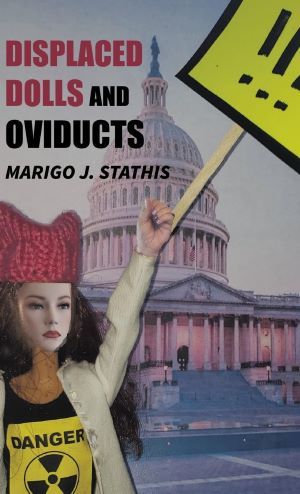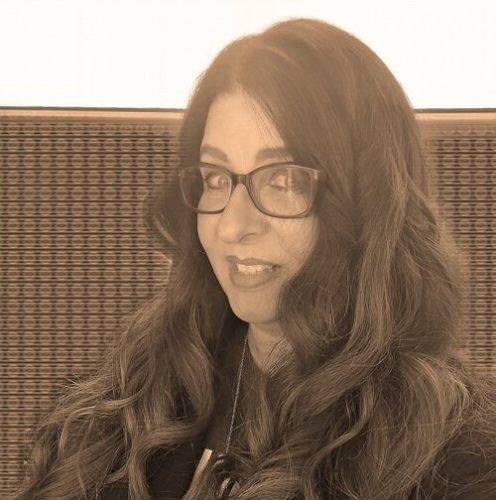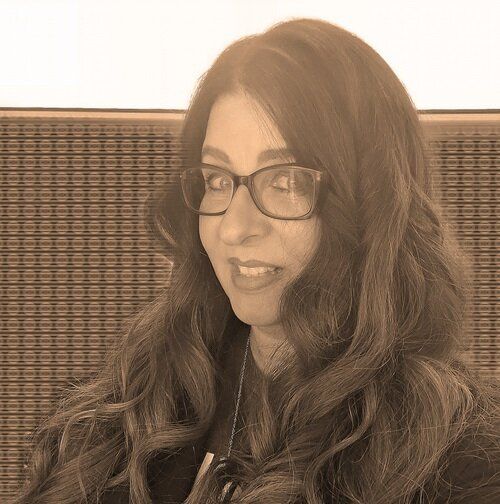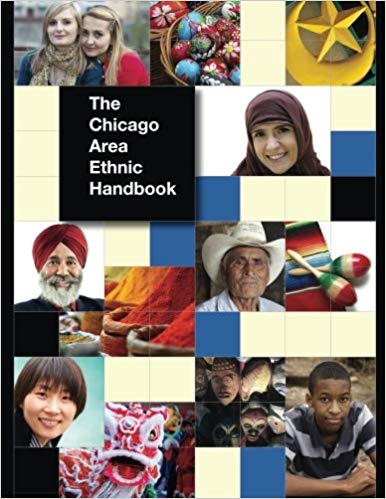Poet Spotlight: Marigo J. Stathis
I met Marigo J. Stathis in a writers group and she recently did a presentation on her book. Right then, I knew I wanted to introduce my readers to her. So without further ado, let’s meet her!
Greek-American Poet Marigo J. Stathis
Marigo J. Stathis has lived in multiple places in the US and abroad, but these days, she calls Baltimore, MD home. She’s a scientist, and recently published a poetry collection, called Displaced Dolls and Oviducts (Finishing Line Press, 2023).
I’m an Amazon affiliate. As an Amazon affiliate, I earns money from qualifying purchases. By clicking through the links, when you make a purchase, I will receive a small commission at no additional cost to you. It helps to support my writerly endeavors. Thank you!
Q & A with Marigo J. Stathis
… On her Greek roots
Where is your family from in Greece?
From the Parnonas plateau of the Peloponnese Mountains, and Athens.
Does your Greek heritage inform or inspire your work?
Humorous, poignant, and ethnic family memories always provide great fodder for my writing. I tend to incorporate elements of Greek mythology in a lot of my pieces.
… On life and work
Tell us a little more about you.
My husband and I currently live in Maryland. Maryland is like a magnet and keeps calling me back. Baltimore is a vibrant, eclectic city that often gets a bad rep due to misrepresentation by the media.
Do you have a job outside of writing?
In addition to being a writer, I am a scientist, with degrees in Biochemistry and Cognitive Neuroscience from Vassar College and Johns Hopkins University, respectively.

… On reading
Who are some of your favorite authors and poets?
When it boils down to classical novelists, Emily Brontë and Mikhail Bulgakov are favorites. When it comes to newer fiction, Anita Shreve and Margaret Atwood are preferred writers. Shakespeare, Emily Dickinson, Adrienne Rich, Nancy Willard, Leonard Cohen, and Edgar Allan Poe are favorite late poets. Some of my favorite living poets include Nikia Clark Leopold, Patti Smith, and Joni Mitchell—truly masters of their craft!
What types of books do you like to read?
Although I tend to read non-fiction, I also enjoy fiction, particularly when it engages tough thematic matter and/or sci-fi elements.
… On writing
Do you write full-time?
I write ALL the time. For work as a scientist, I do a lot of technical writing. For myself (when not working), I tend to immerse myself in creative writing (i.e., part-time).
When did you start writing?
My earliest childhood memories include writing and reading. In elementary school, a best friend and I used to brainstorm about commercials and different skits…and I would write them down and we would read them out loud, discussed them, and sometimes acted them out.
How and when did you get into writing poetry?
I remember hearing the haunting, narrative E.A. Poe poem, “The Raven” read by a teacher in 2nd grade. The cadence, rhythm, rhyme…all of it drew me in. When she read that poem, the words became a blanket that warmed me. It also awakened something within that had been sleeping, and I felt this tremendous urge to start creating rhymes myself. I discovered that metaphors could symbolize things, I didn’t want to say outright…like a hidden code. Kids LOVE hidden codes. That was the period when my writing (of short poems) started (about 7-8 years of age).
What inspires you?
The kindness of strangers, the honesty of children, the tenacity of the disabled, and the wisdom of elders. I am inspired by people who came from nothing and/or faced severe hardships but dug deeply within and engaged their faith to rise from the ashes and become leaders in their chosen fields. I’ve always been a staunch supporter of the underdog.
What do you like to write?
Genre-wise, my creative writing ranges from feminist wish-fulfillment and speculative to observational narrative and whimsical. I tend to tackle hard subjects, themes, and issues that societies and families often bury. The best way to cast out demons is to call them by their name—to face them head-on, rather than burying heads in the sand, pretending they don’t exist. Evil absolutely does exist and takes many forms: abuse, oppression, annihilation. write about things the way I see it, without apology.
Do you write anything besides poetry?
Yes, I write flash nonfiction, essays, op-eds, song lyrics, fiction, and scholarly articles.
Have you published anything else besides poetry?
In the realm of creative writing, my poems and stories have previously appeared in national and international literary publications like 34th Parallel, Abbey, The Baltimore City Paper, The Baltimore Sun, Bear Creek Haiku, Facedown, FanStory, The Keeping Room, Lite Journal of Satire and Creativity, The Loch Raven Review, The Rush, The Sometimes and several anthologies (i.e., A Question of Balance, The National Library of Poetry, and Whispers).
As concerns technical writing, I have authored/co-authored approximately 50 peer-reviewed, published scientific articles.
Why poetry?
Poetry isn’t just good for the soul, it is also good for humanity, as it increases awareness about the culture and values of a particular place and time in history. It also helps people connect with each other, in the realization that they are not alone in experiencing emotions that otherwise feel isolating, existential, raw. Further, poetry provides a voice to and for many people, including those who are marginalized, such that their thoughts can be expressed without ridicule or judgement. Having a safe space in which to manifest one’s voice is liberating and cathartic. Poetry is healing, and creating it costs NOTHING, beyond a pen and paper. That’s pretty cool, in and of itself. Its creation transcends socioeconomic strata.
When did you start writing poetry?
In second grade.

… On your book
Tell us about your book.
It’s a small but mighty chapbook of poems I wrote over the course of three decades, entitled, Displaced Dolls and Oviducts It has been described as a “A bold, edgy, and heartrending collection of verse that speaks to the modern woman’s authentic experience, covering ground from the whimsical and mythical to the solemn and appallingly foul. Deftly woven together are fabrics of topical issues related to vanity, aging, mental health, friendship, family, love, grief, trauma, survival, self-discovery, and acceptance. Whether from the perspective of a female tattoo artist, assault victim, or stranger in a ladies’ room, poems as lyrics of raw truth serve as springboards for connection, celebration, and healing.”
I tend to play around with point-of-view (POV). Some poems written in the 1st person POV are about others’ experiences, and some poems written in the 3rd person POV are about me. I like to mix things up a bit!
I’m excited about the endorsements I have received, including those of writers/scholars Dr. Nikia Leopold, Dr. Marguerite Tassi, and Eric Stull. I also received a glowing endorsement from the celebrity songwriter and women’s issues advocate, Tori Amos, which absolutely blew my mind!
When did the book come out?
Late summer of 2023. It was published by the award-winning, small press publisher, Finishing Line Press, based in Georgetown, Kentucky, USA.
What made you want to publish the book?
I think a combination of the #Metoo movement, the realities of the recent COVID-19 pandemic, and the urge to leave a literary mark created the “Perfect Storm” in bringing the book to fruition. It was a LOT of work, and often felt painful…but suffering for that which we love is literally the root definition of the word “passion”.
… On the future
What’s next for you?
I’m working on a series of fun videos (with an amazing videographer in Baltimore, Ken Mars), in order to help promote Displaced Dolls and Oviducts on different social media platforms. So be on the lookout!
I’m also continuing with writing flash nonfiction, which is just so much fun! I have so many ridiculous, humorous anecdotes that have transpired throughout my life, so why not write about them?
Anything else you’d like to share?
I am donating proceeds of the sales of my chapbook to the Baltimore non-profit close to my heart, www.dewmorebaltimore.org. It’s so important to “Pay it forward” in life!
Also, I am planning on adding a “Favorite books/authors” section on my website soon!
Currently, my goal is to sponsor at least one writing contest or giveaway a year. Right now, there is a Displaced Dolls and Oviducts Book Review giveaway contest going on (deadline is April 15, 2023). Anyone who writes a book review about my book gets a chance to win an Amazon gift card! The full set of rules are on my website, so check it out.
Check out Marigo J. Stathis’ website
Follow her on Facebook & Instagram
Read more:
Author Spotlight: Greek-American Author Tassie Kalas
Author Spotlight: Christina Vourcos


